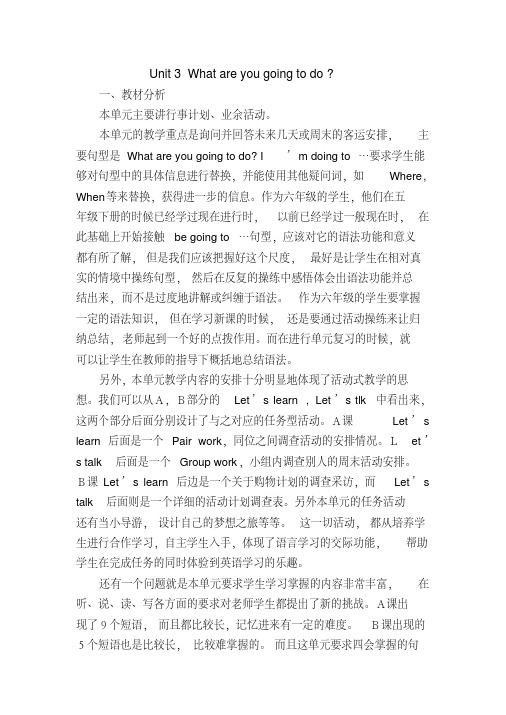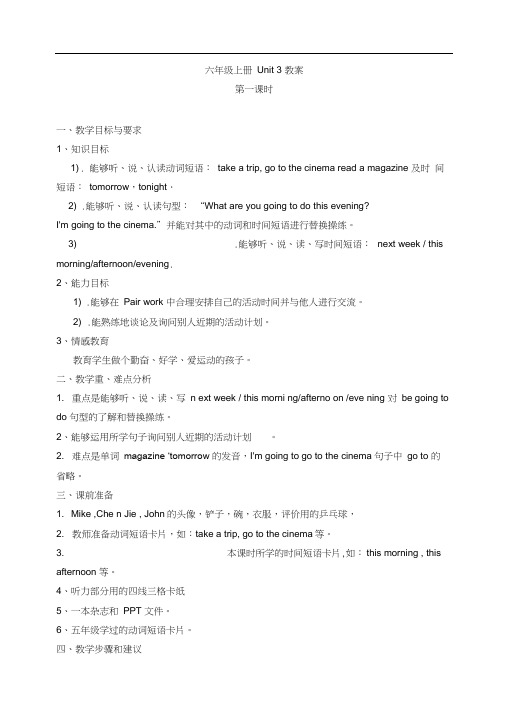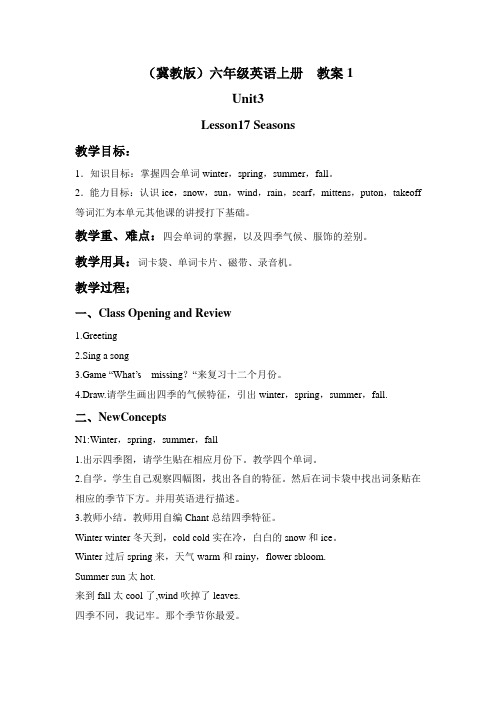六年级英语(上)电子备课Unit3
- 格式:doc
- 大小:142.50 KB
- 文档页数:14

人教PEP版六年级英语上册第三单元教案Unit3My weekend plan教学设计一、教学目标:1、能够听、说、认读句型:”What are you going to do this evening?I’m going to the cinema.”并能对其中的动词和时间短语进行替换操练。
2、能够听、说、认读动词短语:take a trip,go to the cinema,read a magazine.3、能够听、说、读、写时间短语:next week,this morning/afternoon/ evening;并能够听、说、认读时间短语:tomorrow,tonight.4、能够在Pair work中合理安排自己的活动时间并与他人进行交流。
二、教学重、难点:1、本课时的教学重点是能够听、说、读、写Let’s learn部分的四会短语;并能替换be going to do句型中的动词和时间短语对将来的活动进行表述。
2、本课时的教学难点也是四会词汇的听、说、读、写以及对be going to do 句型的理解和替换操练。
三、教学准备:多媒体课件、录音机、磁带、字典、连环画、单词书、明信片、其他学习用具四、教学过程:Step1热身(warm—up)1、Greeting。
What day is it today/tomorrow?What do you usually do on Mondays?(日常会话是为了巩固和复习与新知识相关联的句型,为学习新知识作铺垫。
)2、ReseveReseve the new words of the text.3、Let’s sing.这一步我利用多媒体,点击播放本单元歌曲“What are you going to do?”学生初步感知be going to do句型。
(设计意图:通过歌谣的引入,调动学生的学习兴趣、吸引学生的注意力,向本课时进入主题做准备。

六年级英语上册Unit3教案(新版苏教版)六年级英语上册Unit3教案(新版苏教版)六年级上册第三单元第1时教案Teahing ntents 教学内容Str tieTeahing ais and learning betives 教学目标1 能听懂、会说、会读、会写单词:hlida, Natinal Da。
2 能听懂、会说、会读、会写句型:hat did u d fr the hlida?;I …;Did u …?;es, I did/N, I didn’t。
3 能听懂、会说、会读单词:all, Bund, Shanghai useu。
4 能听懂、会说、会运用日常交际用语:here did u g fr the hlida?I ent t … H as ur hlida? It as …。
能初步感知一般过去时的疑问句。
6 能理解内容,并能尝试复述,能尝试用过去式谈论假期趣事。
Fus f the lessn and predited area f diffiult 教学重点和难点教学重点:能正确地理解并朗读对话内容,在教师的引导和帮助下复述。
教学难点:能理解内容,并能尝试复述,用过去式谈论假期趣事。
Teahing predures 教学过程Step 1 ar-up and free talT: Bs and girls, ele ba t shl It as Natinal Da hlida last ee Did u have a gd tie during hlida? (新授Natinal Da, hlida)【设计意图:通过谈话自然导入刚刚结束的十一长假,学生对刚过去的节日感触比较深,有话可讲。
】Step 2 Presentatin1 T: I als had a nderful hlida, and I t se phts n Natinal DaL at these phts and guess (出示一些上海的照片)2 T: here did I g fr the hlida? hat did I d there? Guess!3 T: (总结) es, I ent t Shanghai last Natinal Da hlida I visited the Bund and the Shanghai useu (分别教学:the Bund, the Shanghai useu)(出示图片让学生说一说:The Bund is _______________The Shanghai useu is _________________)4 T: hat abut u? here did u g fr the hlida? hat did u d there?(教学句型)T: e all ha d hlida fun S let’s tal abut hlida fun【设计意图:通过感受老师的国庆假日,渗透本的两个重点句型。

N 弣T O u(f鬳筄Unit 3 What are you going to do ?一、教材分析本单元主要讲行事计划、业余活动。
本单元的教学重点是询问并回答未来几天或周末的客运安排,主要句型是What are you going to do? I’m doing to…要求学生能够对句型中的具体信息进行替换,并能使用其他疑问词,如Where , When等来替换,获得进一步的信息。
作为六年级的学生,他们在五年级下册的时候已经学过现在进行时,以前已经学过一般现在时,在此基础上开始接触be going to…句型,应该对它的语法功能和意义都有所了解,但是我们应该把握好这个尺度,最好是让学生在相对真实的情境中操练句型,然后在反复的操练中感悟体会出语法功能并总结出来,而不是过度地讲解或纠缠于语法。
作为六年级的学生要掌握一定的语法知识,但在学习新课的时候,还是要通过活动操练来让归纳总结,老师起到一个好的点拨作用。
而在进行单元复习的时候,就可以让学生在教师的指导下概括地总结语法。
另外,本单元教学内容的安排十分明显地体现了活动式教学的思想。
我们可以从A,B部分的Let’s learn , Let’s tlk中看出来,这两个部分后面分别设计了与之对应的任务型活动。
A课Let’s learn后面是一个Pair work,同位之间调查活动的安排情况。
Let’s talk后面是一个Group work,小组内调查别人的周末活动安排。
B课Let’s learn后边是一个关于购物计划的调查采访,而Let’s talk后面则是一个详细的活动计划调查表。
另外本单元的任务活动还有当小导游,设计自己的梦想之旅等等。
这一切活动,都从培养学生进行合作学习,自主学生入手,体现了语言学习的交际功能,帮助学生在完成任务的同时体验到英语学习的乐趣。
还有一个问题就是本单元要求学生学习掌握的内容非常丰富,在听、说、读、写各方面的要求对老师学生都提出了新的挑战。

六年级上册Unit 3 教案第一课时一、教学目标与要求1、知识目标1) . 能够听、说、认读动词短语:take a trip, go to the cinema read a magazine 及时间短语:tomorrow,tonight.2) .能够听、说、认读句型:“What are you going to do this evening?I'm going to the cinema.”并能对其中的动词和时间短语进行替换操练。
3) .能够听、说、读、写时间短语:next week / this morning/afternoon/evening.2、能力目标1) .能够在Pair work 中合理安排自己的活动时间并与他人进行交流。
2) .能熟练地谈论及询问别人近期的活动计划。
3、情感教育教育学生做个勤奋、好学、爱运动的孩子。
二、教学重、难点分析1. 重点是能够听、说、读、写n ext week / this morni ng/afterno on /eve ning 对be going to do 句型的了解和替换操练。
2、能够运用所学句子询问别人近期的活动计划。
2. 难点是单词magazine ‘tomorrow 的发音,I'm going to go to the cinema句子中go to 的省略。
三、课前准备1. Mike ,Che n Jie , John的头像,铲子,碗,衣服,评价用的乒乓球,2. 教师准备动词短语卡片,如:take a trip, go to the cinema等。
3. 本课时所学的时间短语卡片,如:this morning , this afternoon 等。
4、听力部分用的四线三格卡纸5、一本杂志和PPT 文件。
6、五年级学过的动词短语卡片。
四、教学步骤和建议I.热身(Warm-up)1、free talkT : Hello ! Boys and girls . I 'm Miss Wu . Ss : Hello ! Miss Wu .T : Nice to meet you . Ss : Nice to meet you ,too .T : Today I take some gifts to you . Do you want to know what gift I take ?你们想知道老师给你们带了什么礼物吗?猜一猜T : Look , ping-pong .Do you like playing ping-pong ? Ss : Yes .T : Well ,let 's have a competition . I'd like to divide you into two groups. Group A and group B .Anyone who do well in class can get a ping-pong .Le'ts see which group can get more . Ok . Let's go .Ss : Yes .2、Let'chant (师生通过打招呼,引出chant .)T : First , let 's chant together . Now , stand up .Please do follow me“. one , two ,three ,four”(出示PPT chant .先教拍子学一句,再让学生跟着做两遍)Every weekend I climb mountains . What do you do ? What do you do ?Every weekend I read some books . What do you do ? What do you do ?Every weekend I go shopping . What do you do ? What do you do ?Every weekend I go hiking . What do you do ? What do you do ?3、Talk about students'weekends'activities. (让学生说说自己的周末活动)T : What do you often do on your weekends, can you tell me(? 随机点学生回答)T: What do you often do on your weekends ? Ss : I often ... .4、Guess the teache'rs weekends'activities .T :Most of you have a wonderful weekend .Now ,look at my actions and guess what do I often do on my weekends ?T : I often ... (做动作,学生说短语.) Ss : Cook the meals do the dishes wash the clothes sweep the floorn> Presentation .1、,介绍教师自己这个周末的计划,呈现新的动词短语。

(冀教版)六年级英语上册教案1Unit3Lesson17 Seasons教学目标:1.知识目标:掌握四会单词winter,spring,summer,fall。
2.能力目标:认识ice,snow,sun,wind,rain,scarf,mittens,puton,takeoff 等词汇为本单元其他课的讲授打下基础。
教学重、难点:四会单词的掌握,以及四季气候、服饰的差别。
教学用具:词卡袋、单词卡片、磁带、录音机。
教学过程;一、Class Opening and Review1.Greeting2.Sing a song3.Game “What’s missing?“来复习十二个月份。
4.Draw.请学生画出四季的气候特征,引出winter,spring,summer,fall.二、NewConceptsN1:Winter,spring,summer,fall1.出示四季图,请学生贴在相应月份下。
教学四个单词。
2.自学。
学生自己观察四幅图,找出各自的特征。
然后在词卡袋中找出词条贴在相应的季节下方。
并用英语进行描述。
3.教师小结。
教师用自编Chant总结四季特征。
Winter winter冬天到,cold cold实在冷,白白的snow和ice。
Winter过后spring来,天气warm和rainy,flower sbloom.Summer sun太hot.来到fall太cool了,wind吹掉了leaves.四季不同,我记牢。
那个季节你最爱。
教师问:“What’s your favourite season?”引导学回答:“My favourite season is_______?”有困难的可回答:“I like______?”5.Play the audio tapeN2.Different clothes for differents seasons3.IntroduceT:I’m cold. I put on my coat. Puton,say it please.T:Now, I’m hot.I take off my coat.Take off ,say it, please.4.Review利用coat引出对所学衣物的复习。

六年级上册英语教案-Unit 3 Animal world-人教(新起点)一、教学目标1.学生能够掌握单词:lion, tiger, elephant, giraffe, zebra, monkey, panda, koala, and kangaroo。
2.学生能够听懂、理解并能发出以下语句:•What’s this/that? It’s alion/tiger/elephant/giraffe/zebra/monkey/panda/koala/kangaroo.•What’s that in English/Chinese? It’s alion/tiger/elephant/giraffe/zebra/monkey/panda/koala/kangaroo.•Look at thelion/tiger/elephant/giraffe/zebra/monkey/panda/koala/kangaroo!•I like/dislikelions/tigers/elephants/giraffes/zebras/monkeys/pandas/koalas/kangaroos.3.学生能够根据图片提示进行简单的口试交际。
二、教学重点1.单词的听、说、读、写习得。
2.口语交际能力提高。
三、教学难点1.用英语描述动物。
2.理解、回答问题时句型的正确使用。
四、教学过程1.Unit 3 Animal world:让学生感受动物世界的多样以及从中学习更多知识。
2.通过看图片和听声音了解单词。
3.学生自主思考:以图片提示为依据,自由运用提供的句型进行口语交流。
4.练习、巩固语言知识:老师以口语和图片搭配的形式进行互动,并询问学生认知水平。
五、教学策略1.通过互动方式增强学生的口语表现力。
2.给予学生理解和使用语言的支持。
六、教学工具1.图片2.耳机和音频七、教学评估1.记录学习笔记2.学生新学词汇、句式的熟练程度。
人教版小学六年级英语上册第三单元教案Unit3+What+are+you+going+to+do_第一篇:人教版小学六年级英语上册第三单元教案Unit3+What+are+you+going+to+do_人教版小学六年级英语上册第三单元教案Unit3 What are you going to do? 复习教案赣县城关三小蔡昌平教学目标:1.复习一般将来时,能正确运用一般将来时说句子,锻炼学生的语言运用能力。
2.能运用一般将来时完成相关的对话,巩固what、where、when、how 提问的特殊疑问句,并能做出相应的回答。
3.在练习中灵活运用一般将来时,体会它的现实含义。
4.能运用所学语言知识综合起来,应用到实际生活中去,让英语生活化。
教学重点和难点:能运用所学的语言知识综合应用,充分体现在对话操练中。
课前准备:幻灯片一.Review.1.Read LiuYun’s weekend together.2.Answer some questions.1).Is Liu Yun going to the shoe store by subway on Saturday?2).What is Liu Yun going to buy ?3).Where is Liu Yun going with her mother on Sunday?4).Is Liu Yun going to have a happy weekend? 3.T: Well done.Liu Yun is going to have a happy and busy weekend.How are you going to have this weekend? I want to know.Can you tell me? SS:Yes.(提问部分学生回答)二.Presentation:1.T: Great!Everybody is going to have a happy or busy weekend.But I’m going to have a happy weekend, too.I’mgoing to Dongguan.(出示幻灯片)I’m going to buy many things.I’m going by car.I’m going at 3 o’clock.I can’t wait.2.T: In Dongguan, there are so many stores and so many goods.Look here, what shop is it?(出示地方图片)S: It’s a bookstore.X k b 1.c o m T: In the bookstore, what can you buy?S: I can buy-------.3.T:In difference shop we can buy difference things.Is that right? We are very happy when we go shopping.Yes??4.T make a dialogue with students.A: Hello!Where are you going this evening?B:A: What are you going to buy?B:---------------------------A: When are you going?B:--------------------------A: How are you going?A: Thank you.B:----------------------------5.T: Your plan is wonderful!We can use these words to ask your parner.(板书:where→ what →when→ how)三.Consolidation and extension:e these tips to make a dialogue with your parner.Student1:A)Where are you going this afternoon? Student2: A)I’m going to the bookstrore.B)I’m going to go hiking.A)Great.B)What are you going to buy? A)I’m going to buy a story.B)I go to the cinema.c)I’m w atching TV.Student1:A)Where are you going this afternoon? B)What are you going to buy? Student2: A)I’m going to buy some fruits.B)I go to the supermarket with my mother.c)I’m going to the fruitstand.What about you?A)I’m going to the cinema.B)Where is th e fruit stand? C)Is it far from here?D)Thank you.A)You’re welcome.B)It’s near the post office.C)Great.D)No, it’s not far.Student1:A)Where are you going this afternoon? Student2: A)I’m going to the shoe store.B)Yes, I’m going to the theme park.A)Can I go with you ? B)When are you going ? C)Ok.See you then.D)What are you going to do ? A)Sure.C)I’m going to buy a pair ofshoes.D)See you.B)I’m going at 5:30.A)Where is the shoe store ? B)Is it far from here ? C)How are you going there ?D)Can you go on foot ? A)Sure ,it’s good exercise.B)It’s north of the library.C)I’m going by bike.D)Yes ,it’s far.E)No, it’s not far.四.听录音,判断句子对错:1.Mike is going to visit his grandparents this weekend.()2.John’s grandparents live in a beautiful city.()3.Ann is John’s cousin.()4.John and Ann are going to help their grandparents do homework.(5.Ann and John are very helpful.()五.Writing:根据所给的图片,展开合理的想象,写出你星期日下午打算去哪?怎样去?跟谁去?去干什么?六.Homework:Use these tips to write a dialogue.教学反思:这节课主要复习一般将来时,整个教学过程是围绕this weekend 展开,从一开始复习LiuYun’s weekend, 到回答问题,主要让学生回忆起一般将来时,然后出示地方图片,会用What can you buy in the---?提问,为下一个对话作基础,引出where、what、when、how等疑问词进行互问,提高学生英语交际能力,这样可以帮助学生把所学的内容连贯起来,使所学的知识得以整理,能有系统地学习,最终更加牢固地掌握知识,得到应用。
人教PEP六年级英语上册教案Unit 3 What are you going to do?A 第一课时Let’s start Let’s learn Pair workAims: 1.can listen, speak and read the sentences “ What are you going to do this evening? I’m going to the cinema.” Substitute the verb phrases and the timing phra ses.2.can listen, speak and read the phrases “ take a trip” “go to the cinema” “read a magazine”3.can listen, speak, read and write the phrases “next week, this morning/afternoon/evening4.can listen, speak and read the phrases: tomorrow, tonight5.can make a schedule and communicate with others about the plansDifficult and key points: ing the sentence pattern: be going to do.. to express the future activities2.master the timing phrases3.substitute the verb phrasesPreparations: tape, CAI, cardsTeaching process:1.warm upa.free talk: What day is it today? What day is it tomorrow? What do you have on…?A guessing game: What place is it? (You can…) cinema post office librar y park (CAI) b. previewT: Zhang Peng is free today. Look at the pictures. Suppose you’re Zhang Peng. Can you tell me: What are you going to do?” Maybe you will do these things when you are free, too.( CAI) Read and talk: I’m going to… ( write on the b lackboard and explain it)2.PresentationLet’s learna.T: Suppose we’re also free today. What are you going to do? ( CAI…)b.T: You’re going to do so many things. That is good. But when? This morning, this afternoon, or this evening? ( write the phrases on the blackboard and spell them)c. learn “next week and take a trip” (perform it and guess)Next week is National Day. We’re free. What am I going to do next week?Take a trip, take a ship Take a ship, take a trip Take a ship to take a tripd. listen to the tape and follow to read3.Practice and Consolidationa Pair work ( CAI)T: Look! Here are some activities that are good for you. Please decide when you are going to do them and tell your partner. Pay attention: You can do them in two weeks.( Check several groups)b Game: “ Passing the box ”What are you going to do? I’m going to…c quick review of what the students learn today4.Homeworkworkbookcopy the phrasesblackboard designunit 3 What are you going to do?A Let’s learn 将要做的事情表示“将来”的时间What are you going to do this morning/afternoon/evening/tomorrow/tonight/next week?I’m going to…take a trip.read a magazinego to the cinema。